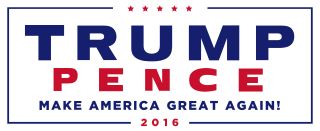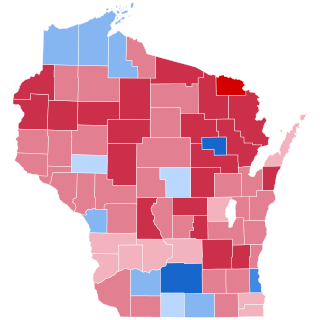
Hillary Diane Rodham Clinton is an American politician and diplomat who served as the 67th United States secretary of state in the administration of Barack Obama from 2009 to 2013, as a U.S. senator representing New York from 2001 to 2009, and as the first lady of the U.S. to president Bill Clinton from 1993 to 2001. A member of the Democratic Party, she was the party's nominee in the 2016 U.S. presidential election, becoming the first woman to win a presidential nomination by a major U.S. political party and the first woman to win the popular vote for U.S. president.

The 2016 United States presidential election was the 58th quadrennial presidential election, held on Tuesday, November 8, 2016. The Republican ticket, businessman Donald Trump and Indiana governor Mike Pence defeated the Democratic ticket of former secretary of state and First Lady of the United States Hillary Clinton and the junior senator from Virginia, Tim Kaine, in what was considered one of the biggest political upsets in American history. It was also the sixth presidential election in which both major party candidates were registered in the same home state; the others have been in 1860, 1904, 1920, 1940, and 1944.
The post-presidency of Bill Clinton began on January 20, 2001 following the end of Bill Clinton's second term as president. Clinton was the 42nd president of the United States, serving from 1993 to 2001. After he left office, he continued to be active in the public sphere, touring the world, writing books, and campaigning for Democrats, including his wife, Hillary Clinton, who served as the junior U.S. senator from New York between 2001 and 2009 and the 67th United States Secretary of State between 2009 and 2013, on her presidential campaigns in 2008, in which she was runner-up for the Democratic nomination, and in 2016, when she lost the election to Donald Trump. After Clinton left office, he ended up forming a close friendship with George H. W. Bush and later, with George W. Bush.
Hillary Clinton is an American politician from the state of New York who was the Democratic Party's 2016 nominee for president of the United States. Clinton is the first woman in U.S. history to be nominated for president of the United States by a major political party. She was defeated in the 2016 general election by Republican Donald Trump.

The 2016 presidential campaign of Gary Johnson, the 29th Governor of New Mexico, was announced on January 6, 2016, for the nomination of the Libertarian Party for President of the United States. He officially won the nomination on May 29, 2016, at the Libertarian National Convention in Orlando, Florida, receiving 56% of the vote on the second ballot. Former Massachusetts Governor William Weld was endorsed by Johnson for the Libertarian vice-presidential nomination, which he also received on May 29, 2016.

In the 2016 presidential campaign, Vermont Senator Bernie Sanders sought the Democratic Party's nomination in a field of six major candidates and was the runner up with 46% of the pledged delegates behind former Secretary of State Hillary Clinton, who won the contest with 54%. Sanders, the junior United States senator and former Representative from Vermont, began with an informal announcement on April 30, 2015, and a formal announcement that he planned to seek the Democratic Party's nomination for President of the United States on May 26, 2015, in Burlington, Vermont. Sanders had been considered a potential candidate for president since at least September 2014. Though he had previously run as an independent, he routinely caucused with the Democratic Party, as many of his views align with Democrats. Running as a Democrat made it easier to participate in debates and get his name on state ballots.

The 2016 presidential campaign of Donald Trump was formally launched on June 16, 2015, at Trump Tower in New York City. Trump was the Republican nominee for President of the United States in the 2016 election, having won the most state primaries, caucuses, and delegates at the 2016 Republican National Convention. He chose Mike Pence, the sitting governor of Indiana, as his vice presidential running mate. On November 8, 2016, Trump and Pence were elected president and vice president of the United States. Trump's populist positions in opposition to illegal immigration and various trade agreements, such as the Trans-Pacific Partnership, earned him support especially among voters who were male, white, blue-collar, working class, and those without college degrees. Many voters in the Rust Belt, who gave Trump the electoral votes needed to win the presidency, switched from supporting Bernie Sanders to Trump after Hillary Clinton won the Democratic nomination.

The 2016 United States presidential election in North Carolina held on Tuesday, November 8, 2016, as part of the 2016 United States presidential election in which all 50 states plus the District of Columbia participated. North Carolina voters chose electors to represent them in the Electoral College via a popular vote, pitting the Republican Party's nominee, businessman Donald Trump, and running mate Indiana Governor Mike Pence against Democratic Party nominee, former Secretary of State Hillary Clinton, and her running mate Virginia Senator Tim Kaine. North Carolina had 15 electoral votes in the Electoral College.

The 2016 United States presidential election in Wisconsin was held on November 8, 2016, as part of the 2016 United States presidential election. Wisconsin voters chose 10 electors to represent them in the Electoral College via a popular vote pitting Republican Party nominee Donald Trump against Democratic Party nominee Hillary Clinton.

On March 3, 2016, U.S. Republican politician Mitt Romney delivered a major speech for the Hinckley Institute of Politics at the Libby Gardner Hall in the University of Utah. In that speech, he denounced Donald Trump, who was then the front-runner in the 2016 Republican Party presidential primaries. He urged citizens to use tactical voting in the remaining primaries and caucuses to maximize the chance of denying Trump a delegate majority.

The Never Trump movement, also called the #nevertrump, Stop Trump, anti-Trump, or Dump Trump movement, is an ongoing moderate conservative movement that opposes Trumpism and 45th U.S. president Donald Trump. It began as an effort on the part of a group of Republicans and other prominent conservatives to prevent Republican front-runner Donald Trump from obtaining the 2016 Republican Party presidential nomination.

Social media played an important role in shaping the course of events surrounding the 2016 United States presidential election. It facilitated greater voter interaction with the political climate; unlike traditional media, social media gave people the ability to create, comment on, and share content related to the election.

The phrase "taco trucks on every corner" was used by American activist Marco Gutierrez, the co-founder of Latinos for Trump, on September 1, 2016 which received widespread attention during that year's presidential election. During an interview with MSNBC, Gutierrez referred to emigration from Mexico, stating that "My culture is a very dominant culture, and it's imposing and it's causing problems. If you don't do something about it, you're going to have taco trucks on every corner."

Donald Trump, the President of the United States from 2017 to 2021, was the subject of segments featured in episodes of Last Week Tonight with John Oliver during Trump's 2016 Republican primary and general election campaigns and presidency, most of which were discussed in the show's opening news recap segment. The ones listed have received prominent coverage from other media, and feature Trump or his actions as part of the main segment.
The DeploraBall was an unofficial inaugural ball event organized by GOTV group MAGA3X and held at the National Press Club in Washington, D.C., on the evening of January 19, 2017, to celebrate the victory and inauguration of Donald Trump. The event fomented controversy due to its alleged association with members of the alt-right, and triggered violent protests outside the venue while the event went on as scheduled inside. In addition to the MAGA3X event, the "DeploraBall" name has also been used to refer to additional events for Trump supporters in Washington, D.C., and other locations. The name is a play on Hillary Clinton's "basket of deplorables" comment made during her 2016 presidential election campaign.

What Happened is a 2017 memoir by Hillary Clinton about her experiences as the Democratic Party's nominee and general election candidate for president of the United States in the 2016 election. Published on September 1, 2017, it is her seventh book with her publisher, Simon & Schuster.
Media coverage of the 2016 presidential election was a source of controversy during and after the 2016 election, with various candidates, campaigns and supporters alleging bias against candidates and causes.

From 2017 through 2021, Donald Trump was the 45th president of the United States; he is the only American president to have no political or military service prior to his presidency, as well as the first to be charged with a felony after leaving office. He is regarded by historians as one of the worst presidents in U.S. history.















